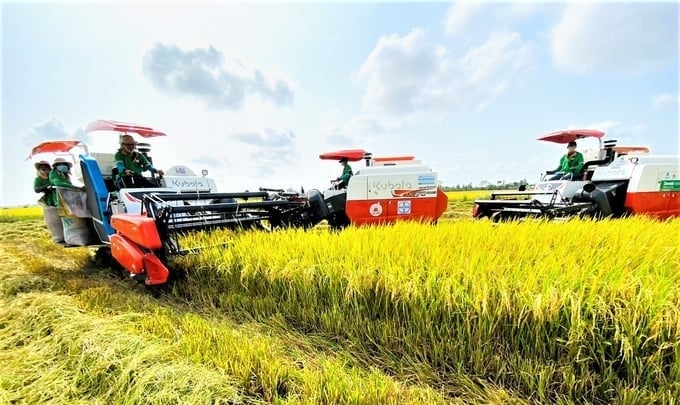May 29, 2025 | 10:33 GMT +7
May 29, 2025 | 10:33 GMT +7
Hotline: 0913.378.918
May 29, 2025 | 10:33 GMT +7
Hotline: 0913.378.918

Traders act as a bridge between farmers and businesses, limiting possible risks for parties involved in the rice industry value chain.
Prime Minister Pham Minh Chinh has just signed Directive No.10/CT-TTg dated March 2, 2024, on promoting sustainable, transparent, and effective rice production, business, and export in the new situation.
The directive clearly states that in 2023, the global food market had many unusual fluctuations, but with the close, flexible and timely direction of the Government, the Prime Minister, ministries, central branches and localities. With the persistent efforts of farmers, the perseverance of businesses, and solutions to open the market and circulate goods, the rice industry has achieved remarkable results in exports and imports (exported over 8.1 million tons of rice, worth nearly US$ 4.7 billion, an increase of 14.4% in volume and 35.3% in value over the same period in 2022 and is the highest level over the past 16 years), making an essential contribution to firmly ensuring national food security.
In the rice industry chain, traders play an important role after each crop. Traders help food companies access/buy fresh rice in the fields for rice farmers, thereby solving the transportation problem for farmers and the drying process after harvesting rice.
When talking about traders, Minister of Agriculture and Rural Development Le Minh Hoan said that traders are an indispensable part of agricultural production and business in the Mekong Delta. Traders need to be seen as partners with producers and companies. Traders need to be confident in their role as a more proactive and positive contributor to the value chain of the agricultural industry.
In addition to piloting the introduction of traders into the rice industry value chain, the Government also assigned the State Bank to direct commercial banks to create favorable conditions for farmers and businesses to access credit sources at high-preferential rates, fully meeting credit needs for rice purchasing and rice export, especially purchasing rice for the winter-spring crop of 2023-2024 in the Mekong Delta provinces.
The study also proposes that competent authorities consider promulgating a credit program to support the production, processing, and consumption of high-quality and low-emission rice products in the Mekong Delta between cooperatives and enterprises following the provisions of the law.
Translated by Tuan Huy

(VAN) The mutual export of agrifood products between the European Union (EU) and the United Kingdom (UK) must occur again without certification, border controls or other red tape. This was agreed at the UK-EU summit.
/2025/05/22/5121-2-173645_677.jpg)
(VAN) NBSAP Tracker identifies strengths and areas for improvement in the National Biodiversity Strategy, based on each region’s priorities and capacities.

(VAN) The draft amendment to the Circular on rice export trading stipulates a periodic reporting regime for rice exporting enterprises.

(VAN) Dong Thap farmers attained an average profit margin of 64% during the summer-autumn 2024 crop (first season), while An Giang and Kien Giang farmers followed with 56% and 54%, respectively.

(VAN) As a doctoral student doing research on renewable energy and electrification at Harvard University, the author shares his musings on electricity, nature, and countryside memories.

(VAN) The decree on Extended Producer Responsibility (EPR) ensures transparent management and disbursement of support funds, avoiding the creation of a “give-and-take” mechanism.

(VAN) Hue City rigorously enforces regulations regarding marine fishing and resource exploitation, with a particular emphasis on the monitoring of fishing vessels to prevent illegal, unreported, and unregulated (IUU) fishing.